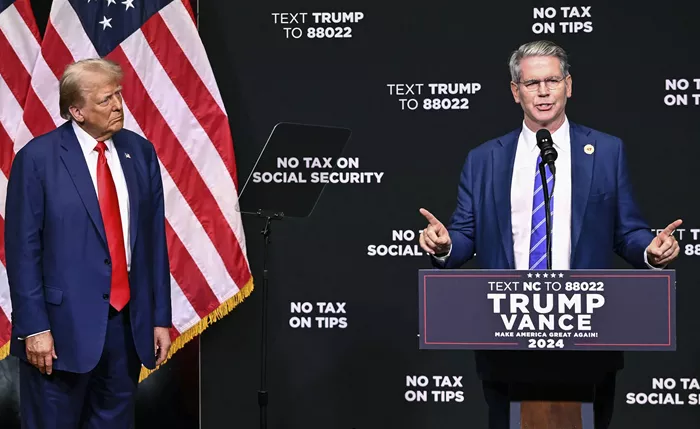President-elect Donald Trump’s selection of Scott Bessent as his nominee for Treasury Secretary generated significant buzz in financial circles, with some anticipating that Bessent’s appointment would rejuvenate the post-election rally that saw U.S. equities soar to new heights. However, while the announcement was well-received by many on Wall Street, some analysts caution that the optimism may be premature, as questions remain about the broader direction of Trump’s economic policy in his second term.
Bessent, a seasoned financier and investor, has long been regarded as a reliable figure within the financial industry. His candidacy was widely supported by Wall Street, which viewed him as a safe and pragmatic choice. This positive reception from the financial community was reflected in a brief rally in U.S. stocks following the announcement. The S&P 500, for instance, rose by 0.30% in the day following the pick, signaling investor confidence in Bessent’s potential to steer the country’s economic policies.
However, not all market observers are convinced that this rally will have lasting legs. Despite Bessent’s mainstream appeal, some remain wary of the broader economic strategy that will unfold under the leadership of Trump 2.0. The key concern among critics is that Trump’s economic agenda may still be highly unpredictable, with Bessent’s role in shaping fiscal policy limited by the overarching influence of the President himself.
Jason Furman, a Harvard economist and former economic advisor to President Obama, expressed caution, stating that while Bessent’s experience in the world of finance is valuable, “the main calls on the economy are going to be President Trump’s.” Furman’s remarks underscore the persistent uncertainty regarding Trump’s long-term economic vision, especially given his unconventional approach to trade and fiscal policy.
A notable concern raised by analysts is the potential lack of cohesion within Trump’s economic team. Terry Haines, founder of Pangaea Policy, warned that Trump appears to be assembling a “team of rivals” for his economic policy, meaning that there may be significant disagreements among his appointees, which could delay or complicate the implementation of any cohesive economic strategy. This team includes notable figures like Elon Musk, who has been tapped to lead the newly formed Department of Government Efficiency (DOGE). While Musk’s role in shaping economic policy remains unclear, his unconventional approach could add another layer of unpredictability to Trump’s economic agenda.
Scott Bessent’s appointment does little to alleviate concerns regarding the President’s trade policies. While Bessent himself has downplayed Trump’s proposed 60% tariff on Chinese goods, calling it a “maximalist negotiating position,” many economists remain worried that such tariffs could be inflationary. A 60% tariff, which would be among the highest ever imposed, could lead to increased costs for U.S. consumers, as businesses typically pass on the cost of tariffs to their customers.
Despite Bessent’s nuanced stance on tariffs, his appointment does little to change the larger concerns about inflationary pressures under Trump’s economic policies. Prominent economists, including multiple Nobel Laureates, have warned that Trump’s tariff-heavy approach could drive up prices for everyday goods. “Big ticket items like tariffs and immigration policy are still coming out of the Oval Office,” said Isaac Boltansky, director of policy research at BTIG. He noted that Trump’s economic presidency will likely be driven by the President’s personal preferences, regardless of who holds positions like Treasury Secretary.
Moreover, there’s a growing concern that Trump’s trade policies—such as his aggressive stance on Chinese imports—will continue to dominate the economic landscape. As Bessent has suggested, Trump’s tariffs are likely part of a broader negotiating strategy rather than a definitive policy move. Still, the potential for such tariffs to become reality has investors and consumers alike bracing for impact.
As President Trump enters his second term, the financial markets will be closely watching how Bessent navigates the complexities of fiscal policy. Investors remain hopeful that his appointment will lead to more stability, but many are equally wary that the administration’s broader trade and tax policies could unsettle the economy in the long run.
In conclusion, while Scott Bessent’s selection as Treasury Secretary was seen as a positive development by many in the financial world, questions remain about the overarching economic strategies that will define Trump’s second term. The president’s approach to tariffs, taxes, and trade negotiations will continue to play a major role in shaping the economic landscape, leaving many investors to wonder whether Bessent’s appointment will prove to be a stabilizing force or simply another element in the unpredictable economic environment of Trump 2.0.
Read more:
Trump Pledges Aggressive Tariffs On Canada, Mexico, And China, Igniting Trade War Fears
COP29’s Climate Finance Deal: A Disastrous Outcome For Human Rights And Global Equity
Dogecoin Hits Three-Year High Amid Speculation Over Elon Musk’S X Payments System

